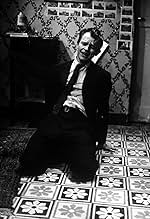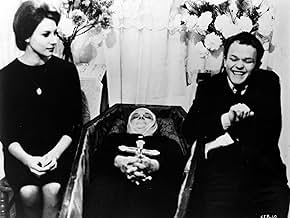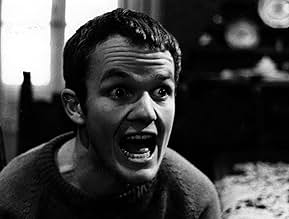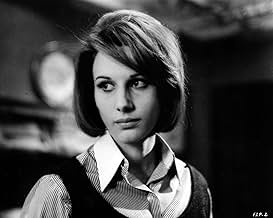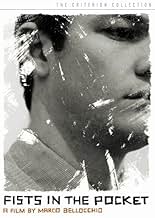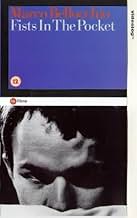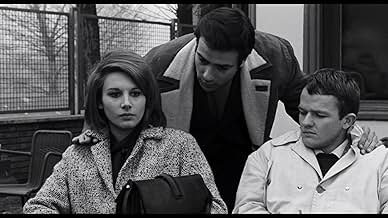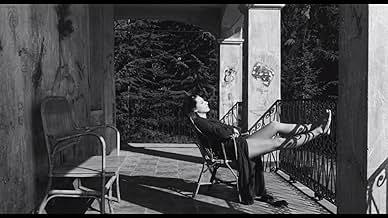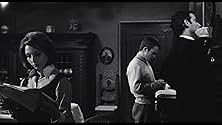NOTE IMDb
7,6/10
5,4 k
MA NOTE
Un jeune homme prend des mesures drastiques pour débarrasser sa famille dysfonctionnelle de ses nombreux problèmes.Un jeune homme prend des mesures drastiques pour débarrasser sa famille dysfonctionnelle de ses nombreux problèmes.Un jeune homme prend des mesures drastiques pour débarrasser sa famille dysfonctionnelle de ses nombreux problèmes.
- Réalisation
- Scénario
- Casting principal
- Récompenses
- 4 victoires et 5 nominations au total
Pier Luigi Troglio
- Leone
- (as Pierluigi Troglio)
Jeannie McNeil
- Lucia
- (as Jenny Mac Neil)
Avis à la une
Marco Bellocchio directs his first full-length film, and it's already a masterpiece, a milestone in the history of Italian cinema.This movie is all about contemporary uneasiness and family crisis in today's society (only, some two decades in advance). Every time I hear of family massacres on the news, I've got to think about problematic, disturbed Lou Castel deciding to get rid of his mother and younger brother for the benefit of the eldest, embodying not only a stage of criminality, but above all a wrong philosophy, a twisted point of view about life, a failed maturity. Ennio Morricone' score is just perfect, fully successful in his aim to highlight the dramatic potential of the story. Lou Castel has never acted like this, his grimacing and his usage of the dead moments are unforgettable. The frames of the mother's death are like an howl, they "send shivers down your spine". A must-see.
I quit watching after 30 minutes, wasn't interested in the storyline and it seemed to be going nowhere. I found it boring and I wasn't interested in the characters.
This first effort by writer/director Marco Bellocchio has been called a drama by some, and a horror film by others. It is both. It is neither.
It is a view of a dysfunctional family. I almost had the impression they cam from a long line of incest like The People Under the Stairs. One wants to get away, another has epilepsy, the mother is blind, one seems to be developmentally disabled, and the last, Giulia (Paola Pitagora)is really not classifiable, but she sure seems to spend a lot of time very close to her brother Ale (Lou Castel).
Ale feels sorry for his older brother, Augusto (Marino Masé) and hatches a plan to drive the rest of the family, including himself off a cliff so his brother can get on with his life.
His plan fails, so he starts doing them in one by one.
Watching him is mesmerizing. You just have to see what he is going to try next. In the meantime, the family just acts as crazy as you would expect.
Bellocchio went on to direct many more great films including A Leap in the Dark, The Prince of Homburg, and The Religion Hour. It is amazing his first was so good.
It is a view of a dysfunctional family. I almost had the impression they cam from a long line of incest like The People Under the Stairs. One wants to get away, another has epilepsy, the mother is blind, one seems to be developmentally disabled, and the last, Giulia (Paola Pitagora)is really not classifiable, but she sure seems to spend a lot of time very close to her brother Ale (Lou Castel).
Ale feels sorry for his older brother, Augusto (Marino Masé) and hatches a plan to drive the rest of the family, including himself off a cliff so his brother can get on with his life.
His plan fails, so he starts doing them in one by one.
Watching him is mesmerizing. You just have to see what he is going to try next. In the meantime, the family just acts as crazy as you would expect.
Bellocchio went on to direct many more great films including A Leap in the Dark, The Prince of Homburg, and The Religion Hour. It is amazing his first was so good.
Beautifully filmed, with nice cinematography and camera movements, mostly in indoor footage, the novienis also interesting in its unique subject. While the development of the story is perhaps too slow in the beginning (although with some grat scenes), the film becomes incrisingly disturbing. Hatred for family, order and tradition is portrayed as aiming a final solution - if you understand what I mean... All members of the family (in different ways, all of them are overly self-centred) are well developped in their dysfunctional relationship, phisically represented in blindness, intellectual disability and epilepsy. Curiously, a "handicapped" himself is moved by a creepy cleansing impulse. Even his closest person, his beautiful sister, with whom he has a complicity relatiinship, is not out of danger.
The first time I saw Fists in the Pocket, I was 7 or 8 years old and I thought the film was a horror movie because of its gruesome subject matter. It had freaked me a lot then. Today, after viewing it for the first time in its entirety, and though I don't think the film can be considered to be an all and out horror flick, I still think there's enough gruesome and eerie qualities to this drama to call it an authentic neo-horror film. A horror film with intelligence. Unlike Hitchcock (no, I'm not saying his films aren't intelligent) or the plethora of other less subtle horror films, where the horror or terror is mostly obvious and played for thrills to manipulate an audience, in Fists the disturbing aspects aren't played out for thrills. They're there to show the sad situation in which the characters exist. Because of this, the film has a true morbid atmosphere, quasi-Gothic in nature, that permeates it from beginning to end. The characters inability to see the horrifying things they do or think (for most part of the narrative) makes this film absolutely unique in film history. It's a vivid "intimate" portrait of a dysfunctional family that's almost a cerebral horror film.
Simply put, it's brilliant!
The actors are all excellent but Lou Castel's performance as the frustrated, crazed, death obsessed brother is mesmerizing. You can't take your eyes off him. And even though it was made in 1965, the film feels contemporary, mainly because of its refusal to amplify and exploit it shocking aspects or the characters' foibles to heights of schlock or melodrama. Plus, the fluid direction gives this morbid drama (which could have easily been heavy and static) a deceptively "normal" quality which works perfectly and adds even more to all of the characters' sad state of mind. The film is equally claustrophobic and expansive; claustrophobic with the (very) tight interiors and the family drama that (like one of the characters of the film wants to do) makes you want to break free and escape at all cost; and expansive because of the Italian countryside that surrounds these doomed characters. The scenery, natural and man-made, is a character of its own, seemingly symbolizing the characters precipitous existence but also overwhelmingly vast, stark and crushing, dwarfing the already tightly-knit family down to minuscule size, which then heightens their already claustrophobic existence that much more. Ennio Morricone's score is characteristically moody & chilling and complements the film perfectly.
Fists in the Pocket is a very earthy, grounded, morbid & blunt portrait of a doomed family! A must-see for those who love "pure" cinema.
Simply put, it's brilliant!
The actors are all excellent but Lou Castel's performance as the frustrated, crazed, death obsessed brother is mesmerizing. You can't take your eyes off him. And even though it was made in 1965, the film feels contemporary, mainly because of its refusal to amplify and exploit it shocking aspects or the characters' foibles to heights of schlock or melodrama. Plus, the fluid direction gives this morbid drama (which could have easily been heavy and static) a deceptively "normal" quality which works perfectly and adds even more to all of the characters' sad state of mind. The film is equally claustrophobic and expansive; claustrophobic with the (very) tight interiors and the family drama that (like one of the characters of the film wants to do) makes you want to break free and escape at all cost; and expansive because of the Italian countryside that surrounds these doomed characters. The scenery, natural and man-made, is a character of its own, seemingly symbolizing the characters precipitous existence but also overwhelmingly vast, stark and crushing, dwarfing the already tightly-knit family down to minuscule size, which then heightens their already claustrophobic existence that much more. Ennio Morricone's score is characteristically moody & chilling and complements the film perfectly.
Fists in the Pocket is a very earthy, grounded, morbid & blunt portrait of a doomed family! A must-see for those who love "pure" cinema.
Le saviez-vous
- AnecdotesThe house, the film's main location, is the house director Marco Bellocchio spent his childhood days in.
- GaffesWhen the whole family is having dinner, Augusto is seated at one corner of the table and the mother is sitting on a side at the other corner. The cat is shown to be eating meat off the mother's plate in one scene, but in the next scene Augusto is shown picking up the cat as if was right next to him on the table. Once he removes the cat, the next camera angle again shows Augusto and the mother at opposite ends.
- Citations
Alessandro: I'm a volcano of ideas.
- ConnexionsEdited into Sorelle (2006)
- Bandes originalesExcerpt from La Traviata
composed by Giuseppe Verdi (uncredited)
lyrics by Francesco Maria Piave (uncredited)
Meilleurs choix
Connectez-vous pour évaluer et suivre la liste de favoris afin de recevoir des recommandations personnalisées
- How long is Fists in the Pocket?Alimenté par Alexa
Détails
- Date de sortie
- Pays d’origine
- Sites officiels
- Langues
- Aussi connu sous le nom de
- Fists in the Pocket
- Lieux de tournage
- Société de production
- Voir plus de crédits d'entreprise sur IMDbPro
- Durée1 heure 50 minutes
- Couleur
- Mixage
- Rapport de forme
- 1.85 : 1
Contribuer à cette page
Suggérer une modification ou ajouter du contenu manquant

Lacune principale
By what name was Les poings dans les poches (1965) officially released in India in English?
Répondre
![Regarder Trailer [OV]](https://m.media-amazon.com/images/M/MV5BNjc5ZDU5NDgtZTliZC00MjQwLThjNjItMDhjZmFmZGMxZTI2XkEyXkFqcGdeQXRyYW5zY29kZS13b3JrZmxvdw@@._V1_QL75_UY281_CR6)
